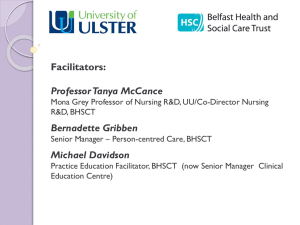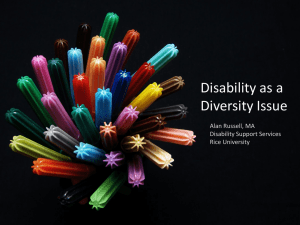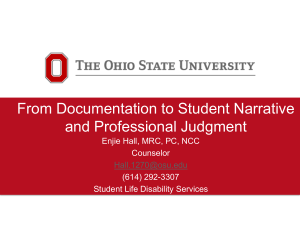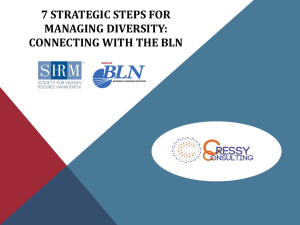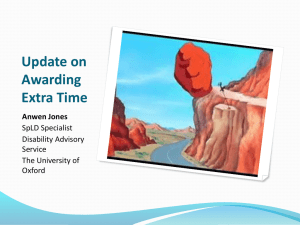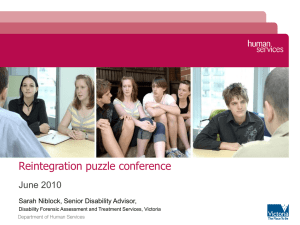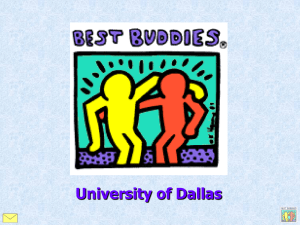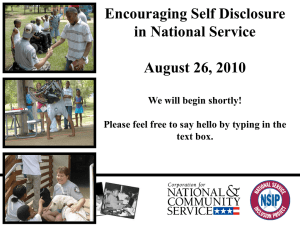Training session 1.
advertisement
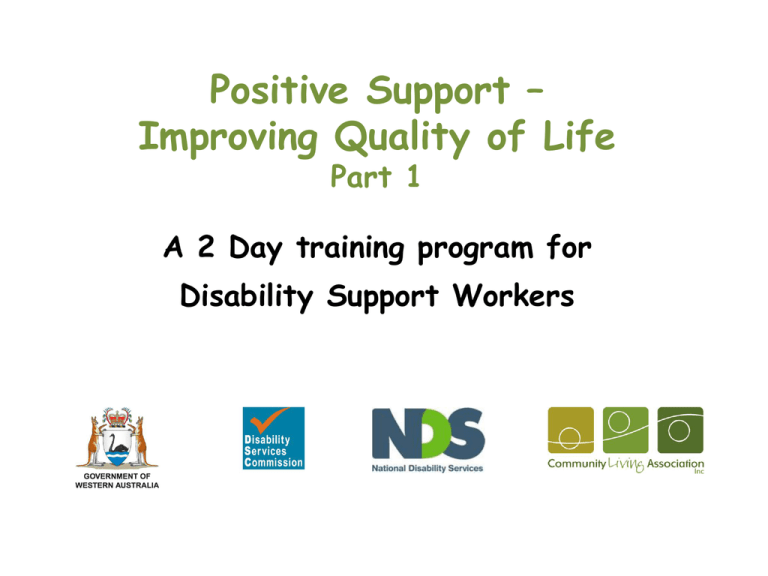
Positive Support – Improving Quality of Life Part 1 A 2 Day training program for Disability Support Workers Positive Support – Improving Quality of Life • Person-centredness • Power: Whose life is it, anyway? • Positive Support: A Good Life Person-centredness • Let’s celebrate our individuality • Each person’s identity is made of many elements and characteristics • Unique attributes, gifts and capacities • We are all unique Activity Person-centredness • We don’t categorise ourselves by one of our characteristics • A disability should not be the basis for a person’s identity Person-centredness Activity Person-centredness • We don’t categorise ourselves by one of our characteristics • A disability should not be the basis for a person’s identity Person-centredness SOCIAL INCLUSION • Everybody – with or without disability – has gifts that can connect them with someone in their community. • The role of support work is to identify those gifts and to enable the connections to happen. • This is how relationships flourish in the community. Person-centredness • We may think that some people have nothing to contribute to society. • But we need to look more closely and find the ways each person can make their own unique contribution, and have meaningful interactions with others. Person-centredness • Labelling a person by a negative characteristic focuses attention on their needs. • Words beginning with in, im, dis, un, de imply a lack of something, a need, a fault or some kind of inferiority. Activity Person-centredness • Every person has some gift or capacity to be of value to others. • Living a good life depends on whether a person’s capacities, choices, gifts and abilities can be expressed. Person-centredness Person-centredness Being excluded means – • social isolation • unachieved potential • lack of life experienced • not being loved and valued as a person • not having control over your own life – less likely to lead to having a good life. Person-centredness The values that underpin social inclusion are: • Everyone Is Ready • Everyone Can Learn • Everyone Needs Support • Everyone Can Communicate • Everyone Can Contribute • Together We Are Better Person-centredness Social inclusion means – • having typical opportunities for friendship, learning, shared experiences, fun • being loved and valued as a person • having control over your own life – more likely to lead to having a good life. Person-centredness Person-centredness HUMAN NEEDS The support relationship is not about doing something for someone who can’t do it themself. It’s more about assisting a person to live the kind of life they want to live. Person-centredness Human Needs – • sharing ordinary places • making choices • developing abilities • being treated with respect and having a valued social role • growing in relationships Person-centredness Human Needs – But these things cannot be achieved inside the service of the organisation you work in. We have to make connections with other people and make things happen out there in the community. Person-centredness NETWORKS - Value of Relationships • people who live within supportive relationships are less likely to become ill or die prematurely • social relationship also reduces the likelihood of mental illness • social relationship contributes to the wellbeing of people • social relationship positively influences our sense of personal control Person-centredness Our social networks are what bind community members together. We make natural connections with family members, neighbours and work colleagues, who introduce us to new people and new opportunities. They include us in events they are planning and keep in touch with us because we matter to them. Person-centredness Each person’s social network is a vital safeguard against abuse and neglect. Service providers play a crucial role in building up and maintaining the social networks of people with disability. We need to act in ways which enhance people’s status, creating new opportunities and allowing people to take greater control in their lives. Person-centredness Like anyone else, people with a disability need support to live their own life the way they want to. Each person needs different amounts of support with different things. Activity Person-centredness National Standards for Disability Services 1. Rights 2. Participation and Inclusion 3. Individual Outcomes 4. Feedback and Complaints 5. Service Access: 6. Service Management Person-centredness BELONGING TO COMMUNITY Making connections in our community means finding out about the kind of life people want to live and working out what it would take for them to get it. Person-centredness All people need to feel that they belong and can identify with others. Connecting with others is closely linked with quality of life and general well-being. Person-centredness We should not assume that our support work alone fulfils that function. Think carefully about everything we do, to ensure we are enhancing the likelihood that people build and maintain their connections to community. Person-centredness Community Connectedness • Consider the whole person • Ensure the person’s own views and interests are being pursued • Focus on common interests • Allow time • Don’t give up trying Activity Person-centredness How do we get to know the person we are supporting? By – • talking with • careful listening • asking questions • listening for answers • being interested • being curious • paying attention Person-centredness “The most basic and powerful way to connect to another person is to listen. Just Listen. Perhaps the most important thing we ever give each other is our attention.” – Rachel Naomi Remen Activity Person-centredness Knowing the person better – • take time and build trust • allow and encourage the person to have a genuine voice/say • take a long term view • set goals, and regularly review the person’s Individual Support Plan Activities Person-centredness Needs, Hopes and Dreams • sense of belonging • feel safe and secure • health and wellbeing • make a contribution to others • sense of purpose • hopes and dreams Person-centredness Family and Service Relationships ? context of family or social network ? sense of belonging, safety, security ? identify areas of control in person’s life ? medication and the reasons for it ? Families are often very tired ? Families may have trouble “letting go”, and may need to learn to trust Support Workers and the service provider. Person-centredness Family and Service Relationships Service, Support Workers and family may all have a different focus We need to work closely with family, build trust through honest and open communication Work together towards the same goals Finding the middle ground between heart and service will be the key to a successful relationship. Person-centredness Challenges Truly listen to and respond to the needs of the individuals Match Support Workers to individuals Introduce people in positive ways Different attitudes and levels of experience of Support Workers Shortfall in funding for staff training
